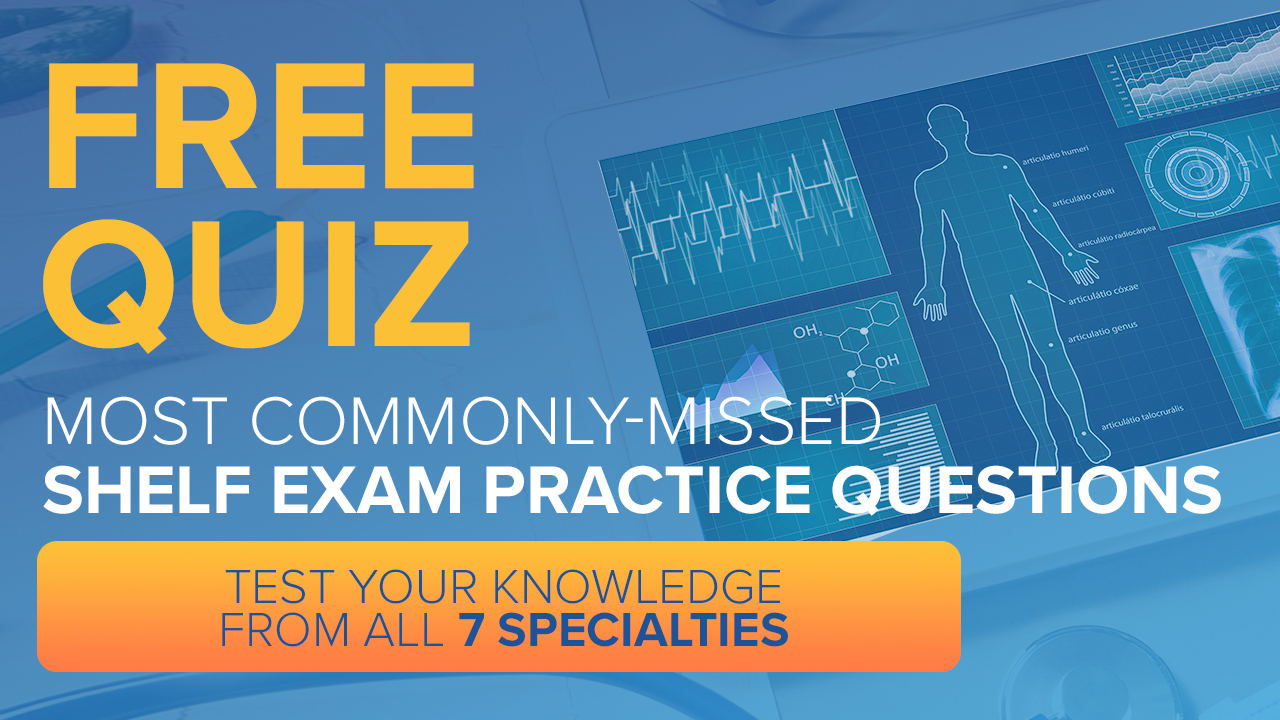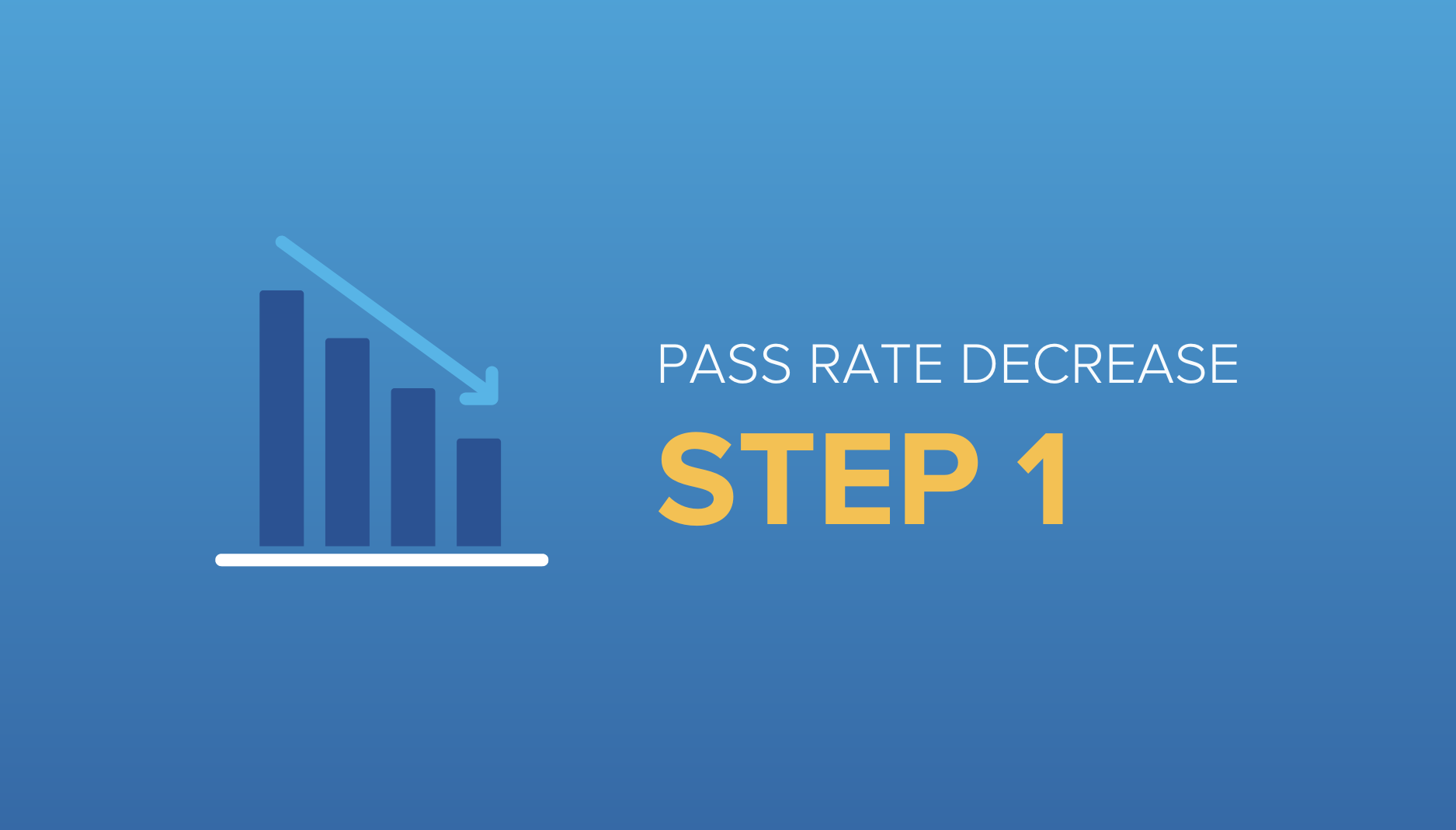Balancing your clinical responsibilities with studying for shelf exams can be daunting. What’s more, there are so many resources it can be equally intimidating to figure out how to study. However, your shelf exams are crucial for setting yourself up for success on Step 2 (especially important now that Step 1 is pass/fail), so it’s important to find the resources that work for you and help you ace your exams. If you’re in the midst of rotations or about to start them and feel unsure about which resources you should use, here is a comparison and breakdown of the top shelf exam study resources.
What Are the Best Shelf Exam Study Resources?
Question Banks
The backbone of any shelf exam study plan is a good question bank. Practice questions are far more engaging than passively reading a textbook or watching a video after a long day of working in a clinic or at the hospital. Furthermore, you can easily pull up questions on a mobile device and study on the go if you have downtime in your day. Finally, a quality question bank will be tailored to the content outline of your shelf exams, so you can feel confident that what you are learning will be high-yield.
The most popular question banks for shelf exams are UWorld, Rosh Review, and AMBOSS. Each Qbank has its advantages and disadvantages, but all of them are effective. All three options have a mobile app where you can complete practice questions on the go. The UWorld bank has 4,000+ questions, the Rosh Review Shelf Exam bank has 3,500+ questions (500 per specialty), and the AMBOSS bank has 3,500+ questions. Of note, Rosh Review and AMBOSS provide free trials to assess whether you like the questions before investing.
In particular, the Rosh Review Shelf Qbank has a great selection of questions carefully categorized by shelf exam. This is an important advantage because it tailors the questions you’re studying to the test you’re about to take. You don’t have to spend time identifying which questions will be relevant to your shelf exam, as each specialty Qbank follows the shelf exam content blueprint with NBME-formatted questions. The practice questions are regularly updated to make sure you’re learning accurate information, and the online and mobile interfaces are intuitive and user-friendly with easy-to-understand metrics that help you understand your performance and identify strengths and weaknesses.
As mentioned earlier, if you’re interested in learning more about the Rosh Review question bank, consider doing the free 30-day trial and try it out yourself.
Want more shelf practice before choosing a study resource? Put your knowledge to the test with this FREE shelf exam practice quiz of the most commonly missed shelf questions from the Rosh Review Shelf Exam Qbanks (one for each specialty)!
Textbooks & Video Resources
Beyond questions, you may augment your studying with textbooks and educational videos. Unlike the USMLE Step 1, no single option like First Aid for the USMLE Step 1 exists for the shelf exams. Instead, different rotations have various key textbooks and video platforms you could build into your study plan, as summarized below by each shelf exam specialty below.
Internal Medicine
The internal medicine shelf exam covers the most content of the shelf examinations, and for this test, you will spend most of your time working through questions. However, if you are looking for good reference material, the Step Up to Medicine book is expansive and succinctly presents content organized by each body system. Another useful resource for this and other shelf exams is OnlineMedEd, the video series highlighting high-yield content in an easy-to-follow format.
Surgery
The surgical shelf exam doesn’t require you to know about many surgical procedures, but it does focus heavily on the medical management of surgical patients. Dr. Pestana’s Surgery Notes is a great summary of high-yield facts and a useful starting point for studying. You may have also heard of the book Surgical Recall—however, this is a more detailed resource for those planning to go into surgery. Otherwise, Surgical Recall isn’t high-yield for the surgery shelf exam by itself.
Pediatrics
Practice questions should make up the bulk of your study plan for the pediatrics shelf exam, but some useful supplements could include the books BRS Pediatrics or Case Files Pediatrics. The Case Files series has a resource available for most of the shelf exams and (as the name suggests) helps you learn by presenting patient cases with discussions and relevant learning points.
Psychiatry
For the psychiatry shelf exam, you will need to feel comfortable with diagnosing and treating psychiatric conditions. First Aid for the Psychiatry Clerkship stands in how it concisely covers much of the high-yield material likely to show up on your exam. If you are interested in additional questions, the Lange Q&A Psychiatry book is a great resource. Most importantly, make sure whichever references you use are updated based on the DSM-5.
Neurology
For neurology, there is no single resource you must use, but some textbook options to supplement questions include Blueprints and Case Files.
Family Medicine
Similarly, you can use a variety of resources to prepare for the family medicine shelf exam, but Case Files is again a useful review book. For video resources, Aquifer Pediatrics publishes a series of video cases with relevant teaching points that are high-yield for the test.
OB/GYN
A unique question bank you may consider here is the UWise question bank published by the American College of Obstetrics and Gynecology. It presents high-yield content with well-written questions and clear explanations. If you’re looking for a textbook to review, some recommendations include Blueprints and Beckmann and Ling’s Obstetrics and Gynecology.
Emergency Medicine
Though it is not technically a review book, Rosh Review practice questions stand out once again among your options for emergency medicine. Rosh Review is a go-to resource for many medical students in large part because it is one of the few banks that has a dedicated set of questions for this test. It otherwise can be challenging and inefficient to sift through a bank and identify which questions are relevant to the shelf exam. A thorough pass through the Rosh Review Qbank will go far in your preparation for this shelf exam.
Flashcards
Are flashcards necessary for shelf exam prep? The short answer is no. The above resources should be enough to feel ready come exam day. That said, however, flashcards can be a great supplement to your studying. Many platforms exist, including Anki flashcards, Quizlet, and even old-fashioned handwritten decks. The advantage of using flashcards is the spaced repetition that comes from revisiting those cards to solidify your knowledge. However, make sure you’re using flashcards correctly. While flashcards cannot be your primary study method, you do have to keep up with them. The only way you can benefit from spaced repetition is if you commit to returning to cards in the future.
In summary, preparing for shelf exams can feel formidable, given how many tests you take over the clerkship year. However, with the right planning, you can transition seamlessly from one to the next and feel confident you’re studying efficiently. Make sure you commit to a quality question bank, supplement with the different high-yield resources for each shelf exam, and see your plan through to success on each test day. Good luck!






